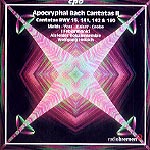By definition, spurious or misattributed compositions possess stylistic characteristics very similar to a composer’s legitimate works, and indeed on a purely musical level are at least as interesting and engaging as much of that same composer’s acknowledged output. Unfortunately, many of the falsely assigned pieces are shunned by musicians as soon as their true provenance is discovered–but this unfairly denies the fact of the works’ integral quality that led to their erroneous assignation. Fortunately, conductors, ensembles, and record labels of the type represented on this release recognize the value of keeping such works alive, and here, in a second volume of “apocryphal cantatas”, they allow us to appreciate some of the more wonderful compositions Johann Sebastian Bach never wrote. Most familiar probably is the Christmas cantata BWV 142, which in its opening contains one of the more famous musical themes of all time, stated first in the orchestra, then by the chorus. The rest of this 13-minute sequence of arias and choruses is equally tuneful and “catchy”–and if Bach didn’t write it, he probably would have been proud to claim such an attractive musical exaltation of Christ’s birth. Who did write it? No one knows.
As for the rest of the cantatas on this program, we do have evidence of their origins, most significantly the pen of Telemann, whose considerable talents were employed in creating the Advent cantata Das ist je gewißlich wahr (BWV 141) and the Easter cantata for tenor Ich weiß, daß mein Erlöser lebt (BWV 160). Perhaps the most interesting work here is the big (21 minutes) two-part Easter cantata (BWV 15) now known to have been composed by Sebastian’s cousin Johann Ludwig Bach. On hearing this work’s quirky, dramatic opening, a series of chords that suddenly explodes in a flourish of brass followed by a bass aria, it’s hard to believe that anyone seriously could connect it with Sebastian’s output–and what follows is similarly oddly constructed but always fascinating–but it does have a certain stylistic integrity that places it firmly in the broader Bach universe. The soprano/alto duet Weichet, Furcht und Schrecken is a gem. The performances–by soloists, orchestra, and chorus–are uniformly excellent and splendidly recorded, and only emphasize the fact that good music is good music, deserving to be heard and respectfully, seriously considered by all who profess to appreciate Bach–even if it’s really by Telemann, or a long-lost cousin. [7/16/2004]
































